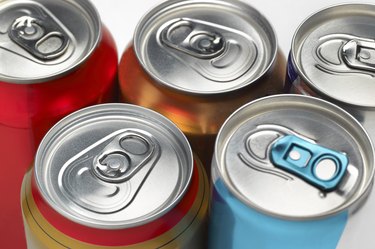
Energy drinks can give you a boost if you are feeling lethargic, and Red Bull claims that its energy drink increase your energy and focus, according to its website Redbull.com. Red Bull drink is also available in a sugarfree version.
Red Bull Energy Drink comes in a 8.4 ounce can, and Red Bull benefits include nutrients such as the amino acid taurine and some B vitamins. However, this energy drink may also have some risks and side effects that you should be aware of before you drink it.
Video of the Day
Video of the Day
Red Bull side effects can include weight gain, insomnia, tooth decay and possible increased risk of osteoporosis. Red Bull health risks also include interactions with alcohol and some medications.
Read more: Long-Term Effects of Caffeine
Watch Your Weight
According to the Centers for Disease Control and Prevention, more than a third of American adults are living with obesity. As a result, they may also be at risk for other chronic diseases such as cardiovascular disease or diabetes. To lose weight or prevent weight gain, don't consume more calories than you expend.
A can of Red Bull Energy Drink has 117 calories and 27 grams sugar. Sugars are simple carbohydrates that do not provide vitamins or minerals, and eating too many high sugar foods can make it difficult to eat all of the nutrients you need each day without gaining weight. Red Bull also has glucose and sucrose, or table sugar.
Get Your ZZZ's
Caffeine is a natural compound in coffee, tea and chocolate, and many manufacturers add caffeine to their energy drinks because it is a stimulant. Red Bulls' website states that caffeine improves mental focus, concentration and alertness.
If you drink Red Bull too close to the time you go to bed, you may have difficulty sleeping because the caffeine may still be stimulating your central nervous system and prevent you from feeling drowsy.
An 8.4 ounce can of Red Bull has 80 milligrams of caffeine, compared to about 35 to 45 milligrams in a 12-ounce can of caffeinated soda, according to the U.S. National Library of Medicine. Caffeine has greater effects on people with higher caffeine sensitivity.
Avoid Chronic Conditions
Drinking Red Bull consistently could potentially increase the risk for chronic health problems. Added sugars such as the glucose and sucrose in Red Bull cause tooth decay, and the 2015-2020 Dietary Guidelines for Americans recommend limiting your sugar intake to prevent dental problems.
If you regularly depend on energy drinks with caffeine to keep yourself alert, you may become dependent and have difficulty focusing without them.
One of the potential dangers of Red Bull is the possibility of increased risk for osteoporosis — caffeine causes the body to lose calcium, resulting in weak bones. However, more research is needed to confirm this, according to the Cleveland Clinic.
Caffeine can also interact with heart medications and it can also cause heart arrhythmia.
Read more: Green Tea Vs. Coffee: Which Has More Caffeine?
Beware Interaction With Alcohol
Red Bull is often used in alcoholic mixed drinks at bars and night clubs. Combining energy drinks and alcohol is unlikely to pose a significant health risk to healthy people, according to a literature review published in the International Journal of General Medicine in March 2012.
However, the long-term effects of energy drinks mixed with alcohol requires further investigation to determine their safety.
- Redbull.com: "Red Bull Energy Drink"
- Health.gov: "Dietary Guidelines for Americans, 2015-2020: Chapter 1. Key Elements of Healthy Eating Patterns"
- U.S. National Library of Medicine: "Caffeine"
- Centers for Disease Control and Prevention: "Adult Obesity Facts"
- International Journal of General Medicine: "Energy Drinks Mixed With Alcohol: Misconceptions, Myths, and Facts"
- Cleveland Clinic: "Sodas, Tea and Coffee: Which Can Make Your Bones Brittle?"